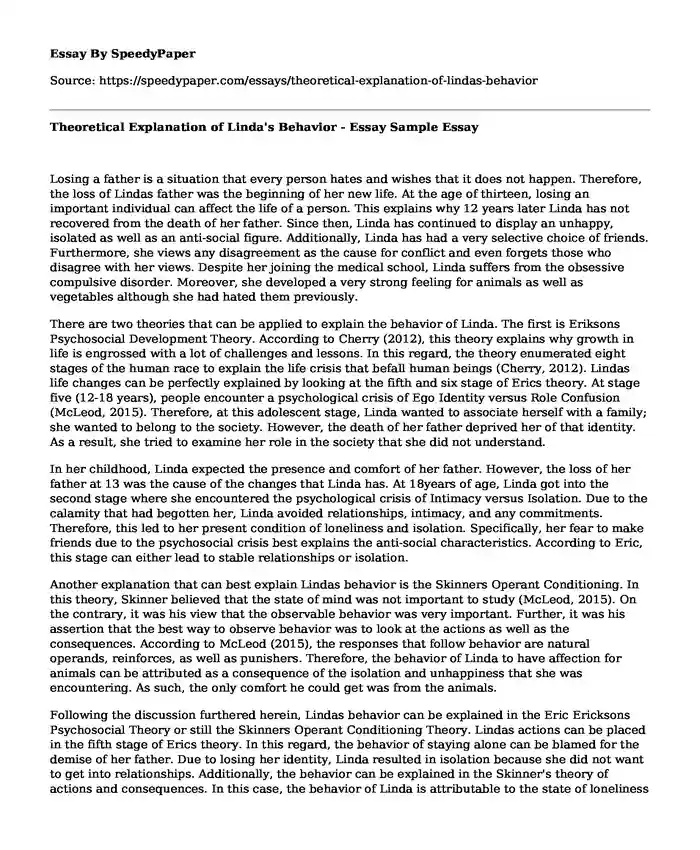
| Type of paper: | Essay |
| Categories: | Psychology Human behavior |
| Pages: | 3 |
| Wordcount: | 696 words |
Losing a father is a situation that every person hates and wishes that it does not happen. Therefore, the loss of Lindas father was the beginning of her new life. At the age of thirteen, losing an important individual can affect the life of a person. This explains why 12 years later Linda has not recovered from the death of her father. Since then, Linda has continued to display an unhappy, isolated as well as an anti-social figure. Additionally, Linda has had a very selective choice of friends. Furthermore, she views any disagreement as the cause for conflict and even forgets those who disagree with her views. Despite her joining the medical school, Linda suffers from the obsessive compulsive disorder. Moreover, she developed a very strong feeling for animals as well as vegetables although she had hated them previously.
There are two theories that can be applied to explain the behavior of Linda. The first is Eriksons Psychosocial Development Theory. According to Cherry (2012), this theory explains why growth in life is engrossed with a lot of challenges and lessons. In this regard, the theory enumerated eight stages of the human race to explain the life crisis that befall human beings (Cherry, 2012). Lindas life changes can be perfectly explained by looking at the fifth and six stage of Erics theory. At stage five (12-18 years), people encounter a psychological crisis of Ego Identity versus Role Confusion (McLeod, 2015). Therefore, at this adolescent stage, Linda wanted to associate herself with a family; she wanted to belong to the society. However, the death of her father deprived her of that identity. As a result, she tried to examine her role in the society that she did not understand.
In her childhood, Linda expected the presence and comfort of her father. However, the loss of her father at 13 was the cause of the changes that Linda has. At 18years of age, Linda got into the second stage where she encountered the psychological crisis of Intimacy versus Isolation. Due to the calamity that had begotten her, Linda avoided relationships, intimacy, and any commitments. Therefore, this led to her present condition of loneliness and isolation. Specifically, her fear to make friends due to the psychosocial crisis best explains the anti-social characteristics. According to Eric, this stage can either lead to stable relationships or isolation.
Another explanation that can best explain Lindas behavior is the Skinners Operant Conditioning. In this theory, Skinner believed that the state of mind was not important to study (McLeod, 2015). On the contrary, it was his view that the observable behavior was very important. Further, it was his assertion that the best way to observe behavior was to look at the actions as well as the consequences. According to McLeod (2015), the responses that follow behavior are natural operands, reinforces, as well as punishers. Therefore, the behavior of Linda to have affection for animals can be attributed as a consequence of the isolation and unhappiness that she was encountering. As such, the only comfort he could get was from the animals.
Following the discussion furthered herein, Lindas behavior can be explained in the Eric Ericksons Psychosocial Theory or still the Skinners Operant Conditioning Theory. Lindas actions can be placed in the fifth stage of Erics theory. In this regard, the behavior of staying alone can be blamed for the demise of her father. Due to losing her identity, Linda resulted in isolation because she did not want to get into relationships. Additionally, the behavior can be explained in the Skinner's theory of actions and consequences. In this case, the behavior of Linda is attributable to the state of loneliness that she was in when her father left. As such, she has developed a behavior from the effects of the demise.
References
Cherry, K. (2012). Erikson's theory of psychosocial development psychosocial development in infancy and early childhood. The New York Times Company. http://psychology. about. com/od/psychosocialtheories/a/psychosocial. htm [26 May 2012].[Links].
McLeod, S. (2015). B.F. Skinner | Operant Conditioning | Simply Psychology. Simplypsychology.org. Retrieved 23 October 2015, from http://www.simplypsychology.org/operant-conditioning.html
McLeod, S. (2015). Erik Erikson | Psychosocial Stages | Simply Psychology. Simplypsychology.org. Retrieved 23 October 2015, from http://www.simplypsychology.org/Erik-Erikson.html
Cite this page
Theoretical Explanation of Linda's Behavior - Essay Sample. (2020, Aug 13). Retrieved from https://speedypaper.net/essays/theoretical-explanation-of-lindas-behavior
Request Removal
If you are the original author of this essay and no longer wish to have it published on the SpeedyPaper website, please click below to request its removal:
- Free Essay with the List of Benefits and Risks of Using Electronic Health Records
- Free Essay on the Genetic Assessment Issues
- Essay Example: Assessing Virgin Media Readiness for Change
- Free Essay: Analyzing Mixed and Visual Rhetoric of Google Home Mini Ad
- Essay Sample: Appraising the Effects of Different Classes of Securities
- A Change in the Management Style
- Compare and Contrast Essay on Cameroon and Stokeling Cases
Popular categories




